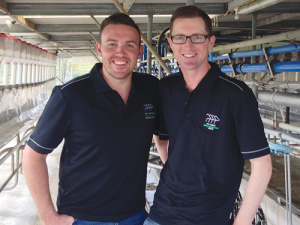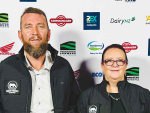I was chatting to a mate the other day about mating when it dawned on me that we wouldn’t know each other if it weren’t for the Dairy Industry Awards.
People enter the competition for various reasons. Some 50/50 sharemilkers and contract milkers enter to get free advice and judges’ feedback on ways to improve and grow their businesses.
Others, like trainees and 2ICs, enter because it’s a confidence booster, lifts their profile and helps their CVs shine. I know one 50/50 sharemilker who went to the Auckland/Hauraki awards dinner in March to hunt for a new team member.
My partner Matt and I entered to challenge ourselves and meet people. Most of our neighbours at the time were sheep and beef farmers. We were career changers and saw it as an opportunity to network.
Mingling with sponsors is also beneficial. It’s how we met our new accountants Campbell Tyson. Most of the sponsors know farm owners who could be looking for new business partners or staff.
Sponsors contribute more than just their time and expertise. They help fund the event and the substantial prize pool.
A sponsor and entrant night is held not long after entries close. It’s a fun evening; ours involved team games, a free dinner and plenty of laughs.
Previous winners were on hand to help ease the nerves of entrants and answer questions about preparing for judging. Their words of wisdom were invaluable.
I won’t lie, entering the awards requires work. But it’s rewarding to critically analyse every aspect of your business and focus on your career goals. We were on a split-calving farm, so our national round of judging was during calving. We treated the process like having a visit from an uncle who’s extremely interested in what we did.
The revamped Dairy Industry Awards website contains judging criteria for all three sections of the competition to help you plan.
We started at our house, flicking through some photos. We printed graphs from the Farm Source website highlighting our achievements. However, we spent most of the time in the paddock explaining how we managed the pasture and herd.
If you’re nervous about speaking in front of other people, don’t let that deter you from entering. I’m very shy though I used to be a TV reporter. But talking to a TV camera is like talking to yourself in the bathroom mirror. It’s completely different having people around.
For the Share Farmer of the Year and Dairy Manager of the Year entrants, judges come to your farm. You explain how you run the place and why you do things the way you do. Judging for trainees is a mix of practical skills plus an interview section.
If you’re a farm owner reading this, shoulder tap a staff member who could benefit from the experience. If you’re a 50/50 sharemilker, this is an ideal way to help your CV rise to the top of the pile the next time you and 60 others apply for the same job.
For farmers on family farms, it’s an awesome challenge and the feedback could help fine-tune your operation. It could also give confidence to family shareholders to let you buy into the business, change its structure or introduce new ways of doing things.
A past winner, who now owns a farm, recently told me he wouldn’t be in his current position if it wasn’t for the competition. It fast-tracked his career.
Entries close November 30.
• Brad Markham and Matthew Herbert are the 2016 Auckland/Hauraki Share Farmers of the Year. Chat to them on Twitter at @BradMarkham81 and @m_herbert











